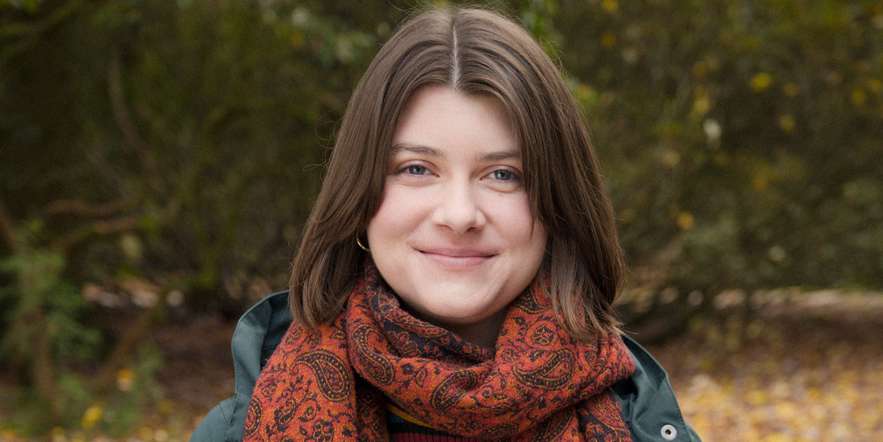
Sound UK’s artist development programme, Sound Generator, supports early career artists and the work they present.
In this series of Spotlight interviews, we find out more about the artists on our 2023 artist development programme, delve deeper into their Sound Generator project and discover what the process has meant to them.
This week, we talk to Heledd C Evans.
Heledd C Evans is an artist and facilitator based in Cardiff, working with sound as both medium and subject matter – from site specific installations and performances, to multi-layered soundscapes.
Please tell us about your Sound Generator project. What is it and where did the initial inspiration come from?
In Spring 2023 I had been part of a project, Organ@Soar with Ty Cerdd and Theatr Soar in Merthyr Tudfil, where 6 composers/sound artists were commissioned to create a new work for the recently restored mechanical organ in the Theatre, which was then performed by James McVinnie. It was such a wonderful project and gave me a lot of direction in my practice, in that working with acoustic instruments and exploring ways of composing is something I really want to pursue.
I found the organ so fun and accessible to work with, which surprised me as I didn’t think it would be. Organs are essentially the first synthesizer – you can create a whole orchestra of sound with just a few buttons. But not many people have access to them, be it by physical barriers (like not having open access to an organ), or a lack of confidence and know-how from no musical training or experience. I really wanted to share the organ with more people, especially in Merthyr Tudfil where the mechanical organ is at Theatr Soar, so my project stemmed around finding ways of connecting people with any range of musical experience to the organ and what it can do.
My project follows Community Music Wales’ creative model of community music – that creativity is a human right, but not everyone has the support needed to exercise this right. Finding ways to create and facilitate creative outlets that are accessible and engaging for people is vital for wellbeing, and what I wanted to achieve ways of working with through my Sound Generator project.
How has your idea developed during the programme so far? And what have you learnt?
Ideas always work very differently in real life to in your head, so having the time to try them out and learn this has been very useful! Creating my own composition tools like key weights (to hold notes down) has been a difficult process, but I now know what sort of shapes work well and how to make them. I’ve also experimented with simple text scores and game-like instructions for how to use these composition tools, and it’s been very valuable testing them out myself and with others to reflect on how they work.
What has this opportunity meant to you?
It’s been wonderful to have extended, unpressured time to work through ideas without the demand to create a final outcome simultaneously. It’s also created the space to equally balance the importance of research and developing with creating, and helped me to understand the role of research in my creative practice as a whole. The mentoring especially has been invaluable to help me achieve this, as well as logistical advice and support from the sound generator team.
Has it helped you to develop your creative practice? If so, how?
This time has helped me to identify and separate different facets of my practice between making art for ‘arts’ sake’, and my practice in facilitation and engagement and a connector of people and ideas, which has been extremely helpful to my process.
Who are your key artistic influences for this project?
I really admire my mentors, Claire M Singer and Kathy Hinde for their invaluable advice and ideas, and how they work with communities in their practices. Exploring fluxus scores and games, as well as deep listening practices from Pauline Oliveros as well as been an integral part of the project.
What have you been listening to recently? Any new music recommendations?
I’ve been to some great gigs recently - I saw Fiona Monbet perform a new orchestral commission, which was amazing! I’ve been loving her album Maelstrom since, especially her track Cantus Carminis. I heard Brìghde Chaimbeul perform at Hidden Notes festival recently as well, and have been listening to her albums non-stop since!
What are your hopes for this project? How do you see it developing beyond this initial 6-month award?
I hope to create more physical composition tools from the natural surroundings in Merthyr and host formalised events to bring different groups to the organ and get people making music! The main aim is to connect people to the organ and sustain relationships with it, from people who currently have no musical outlet, to artists working across different mediums! I would also love to finalise a body of work I have created for this particular organ through a printed score and recording, to mark my time working with this instrument.
We look forward to sharing more details about Heledd C Evans' Sound Generator project as it develops. Visit Heledd's Instagram and follow to find out more about her work.
Sound Generator is Sound UK's artist research and development (R&D) programme that supports early-career artists and seeds the development of an ambitious new project. Following an open call, a panel of leading figures across contemporary music, chose six early-career artists working at the forefront of sound and music.
Sound Generator supports artists in the first 5-10 years of their career. Over the six month programme, they each receive mentoring by a range of professionals to develop an innovative project ready for showcasing to the industry.
To be the first to hear about our latest projects, news and artist interviews, join Sound UK's mailing list and follow us on social media.
